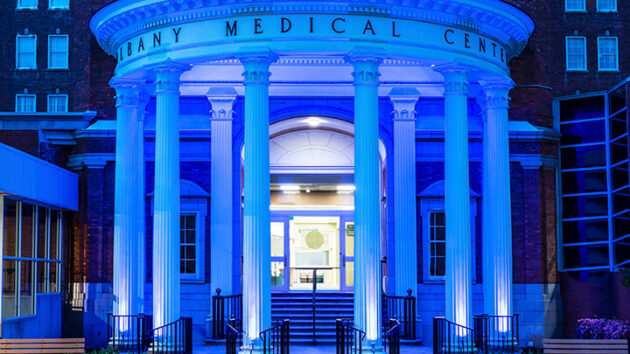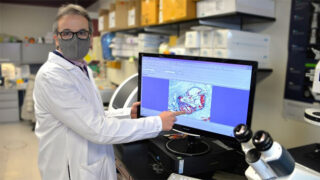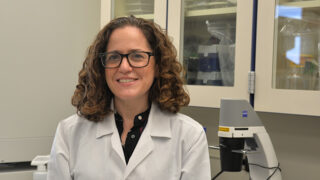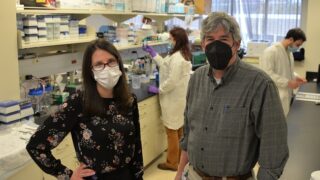Alzheimer's Research
Key to the Future
More than six million Americans are living with Alzheimer’s disease, including 410,000 New Yorkers. It is the sixth leading cause of death in the United States. An important goal is to change that trajectory. As an academic medical system, one of our missions is to conduct biological and clinical research. This includes a recent major $8 million NIH grant to study causes of the disease.
Our scientists at Albany Medical College and our neurologists have been able to secure such large grants in part because of the comprehensive nature and robustness of our Alzheimer’s care.
Research coordinator Kameron DeBell can be reached at 518-264-6192.
Patient trials we are involved in currently or recently include:
- The BenfoTeam clinical research trial aims to increase the amount of thiamine (Vitamin B1) in the brain to slow cognitive decline in people with mild cognitive impairment and mild Alzheimer’s disease. The trial is designed for people who are age 50-89 and experiencing significant memory concerns, or who have already been diagnosed with mild cognitive impairment (MCI) or mild Alzheimer’s disease (AD). Half of the participants are given the study drug, benfotiamine, and half are given an inactive pill (called a placebo) to take twice daily.
- The Alzheimer’s Disease Neuroimaging Initiative (ADNI4) trial is a long-term observational study collecting exam data, neuroimaging, and other biomarker data on people with mild cognitive impairment, dementia, and in cognitively normal people as controls.
- Albany Medical Center participated in two Phase III trials sponsored by Eisai of lecanemab, an anti-amyloid monoclonal antibody. The idea with such agents is that removing amyloid protein, which is deposited in the brain as neuritic plaques, may help slow progression of disease. Lecanemab was approved by the US Food and Drug Administration in July of 2023 after it was shown to delay cognitive and functional decline by approximately five months in an 18-month double-blind, placebo-controlled trial. It is now offered at Albany Medical Center to eligible patients.
The Alzheimer's Association's Trial Match connects individuals with Alzheimer's, caregivers, or healthy volunteers with clinical trials that may advance Alzheimer's research.
CenterWatch provides a variety of clinical research products and services: including clinical trials and results, drug approvals, and study grants.
Researchers in the Department of Neuroscience and Experimental Therapeutics at Albany Medical College are working on several Alzheimer's-related studies.
Biomedical research projects being conducted in the research labs at Albany Medical College include:
- $8 million NIH Grant Supports Multi-Institutional Alzheimer’s Research: As part of a multi-institution collaboration, scientists at Albany Medical College were awarded an $8 million grant from the National Institutes of Health’s (NIH) National Institute on Aging to study the genes that accelerate or slow Alzheimer’s disease. The Albany Med Team is joined by associates from Washington University in St. Louis and the University of California, San Francisco. The researchers use large-scale, CRISPR-based gene editing and screening methods to identify and prioritize the hundreds of genes associated with vascular disease in the brain, which has been shown to be an early driver of the loss of brain function linked to Alzheimer’s. Then, they will seek to understand how these genes act to alter the disease’s progression.
- Examining the Relationship Between Menopause and Alzheimer’s Disease: Exciting research that seeks to understand the effects of menopause on Alzheimer’s disease is being explored by Kristen Zuloaga, PhD, Associate Professor and Director of Graduate Studies in the Department of Neuroscience and Experimental Therapeutics at Albany Medical College, and recipient of a 2021 Research Grant Award from the Alzheimer’s Association. The research is focused on determining the effects of menopause on memory and damage to the brain. It is also looking at whether increasing estrogen in the brain after menopause can improve memory and reduce damage.
Brain autopsy is one of the most important contributions to research. By studying the brains of people with memory problems or cognitive disorders, we are able to expand our knowledge of diseases such as Alzheimer’s and frontotemporal lobe degeneration.
Performing a brain autopsy following death can reduce a family’s uncertainty about the cause of a loved one’s dementia while providing an important contribution to science for study of causes and potential cures.
Discussing brain autopsy ahead of time with family, physicians, and staff can help to ensure preparedness. Consent for autopsy is given in writing after death by the authorized next of kin. The decision is one that is private and highly personal. We can help you think through the process and facilitate and autopsy, but we respect your final decision.
Call us at 518-262-0800 or talk to a staff member when you are at the Alzheimer's Center for more information.




